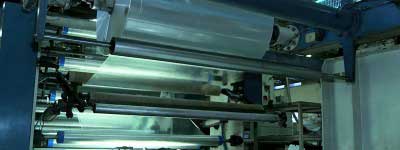
Cosmo Films' $45 million new SEZ plant to strengthen its exports
Jayashankar Menon | @TheDollarBiz
 BOPP films, thermal laminating films and coated films have several applications in food packaging, tape, graphics arts industry, packaging, and self-adhesive labels. Pic source - Cosmo Films
BOPP films, thermal laminating films and coated films have several applications in food packaging, tape, graphics arts industry, packaging, and self-adhesive labels. Pic source - Cosmo FilmsCosmo Films Limited’s new plant in Aurangabad is expected to fulfil the burgeoning export and international operations demands from Europe, Japan and Americas, according to Pankaj Poddar, Chief Executive Officer, Cosmo Films. Cosmo Films Limited is a leader in the manufacturing of a variety of films used in packaging, lamination and other products. Promoted by Ashok Jaipuria, Cosmo Films is the largest exporter of Bi-axially Oriented Polypropylene films (BOPP) films from India. The new plant, which is British Retail Consortium (BRC) certified, has a production capacity of 40,000 metric tonnes of BOPP and 9,600 metric tonnes of thermal laminating films. With this addition, the total installed capacity of Cosmo Films had increased to 1.36 lakh tonnes per annum (TPA) for BOPP, 40,000 TPA for thermal laminating films, 5,000 TPA for coated films and 8,000 TPA for metalised films. Moreover, with the acquisition of GBC's commercial print finishing business, Cosmo Films has now emerged as the largest producer of thermal laminating films in the world, Pankaj Poddar, CEO, Cosmo Films, told The Dollar Business in an exclusive interview. Excerpts:
 Pankaj Poddar, CEO, Cosmo Films
Pankaj Poddar, CEO, Cosmo FilmsTDB: Which are the industries that use BOPP, thermal laminating films, coated films and metalised films? PP: BOPP films have several applications in food packaging, tape and textile and labels market. Thermal laminating films are utilised mostly in graphics arts industry and lamination of packaging boxes. Coated films are mostly used for self-adhesive labels, overwraps and high barrier films, and is also used for food packaging. Coating is still an evolving area and there are more applications being developed on an ongoing basis. TDB: Which are the leading exporting countries for these products? What is India’s position? PP: BOPP is exported from several countries, the prominent ones being India, China, Russia, Peru and the Netherlands. Thermal Laminating Films are being exported from India, China, South Korea and Spain. India has roughly 30% market share of these global exports. Coated films are largely exported out of USA, Europe and India. India has a nominal share in the total exports. TDB: What are your focus markets for your products? PP: We have just concluded a large investment in India and we have been successfully running our new line at 100% capacity. Our focus henceforth shall be to grow in the US market. TDB: What is your current annual sales revenue and exports revenue? PP: Our current annual sales revenue stands at $300 million, of which 60% sales comes from export and international operations. TDB: Why did you acquire GBC’s Commercial print finishing division? PP: We did GBC thermal lamination business acquisition in 2009 and with it, Cosmo Films became the largest lamination film business company having a worldwide presence. The move also provided a strong foothold in the US and Japan market where we had a limited presence. We are now in the process of using this footprint for increasing our presence for our other films such as packaging and coated films. TDB: Any other acquisition plans in the offing? PP: At the moment, we are not working on any specific acquisition. However, we are always open for new opportunities if it fits into our overall growth plan. TDB: How will the new plant in Aurangabad impact the company’s exports? PP: A separate plant with exports focus is very much in line with company’s intent to expand the global footprint. Still we are on the path of consolidation. Our future plans include increasing presence in existing and other international markets, strengthen focus on export markets, innovation and R&D, adding additional capacity to be prepared for the increased consumption in packaging, and, strengthen sales and marketing team and work on market facing rather than product based strategy. Our new BRC certified Shendra plant in Aurangabad has been commissioned keeping in view the extremely stringent quality and hygiene norms in the developed markets especially USA, Japan, Europe and Australia. TDB: This is your third plant. How is it different from other plants? PP: The plant has a state of the art BOPP line with value added lines such as chemical coating, extrusion coating and a metallizer; all planned in one place. The plant is therefore, capable of producing highly specialised films such as thermal and wet laminating films, print receptive self-adhesive label films, lower SIT and COF films and High Barrier metallised films. One extrusion coating, one metalliser and one chemical coating line would be added to the plant by the end of this year. TDB: What are your key markets? PP: Given the fact that Cosmo Films is into specialised films, our focus is largely onto developed markets such as Europe, Japan and Americas. There is market for such films in other parts of the world as well. TDB: What are the advantages of the SEZ and of having production facilities in India? PP: Putting a 100% export-oriented plant in a Special Economic Zone has enabled us to avail several tax benefits. It makes sense to manufacture in a low-cost country and supply globally. TDB: What are the grey areas you would like the new government to address? PP: From our company’s standpoint, there are several areas to be addressed by the new government. We would like to see the government abolish Minimum Alternate Tax (MAT) on SEZ profits, allow focused market incentives on exports from SEZ, and reduce duty on sale of goods from SEZ into the domestic market. We would also like to see Goods and Services Tax (GST) being rolled out.






 to success.
to success.